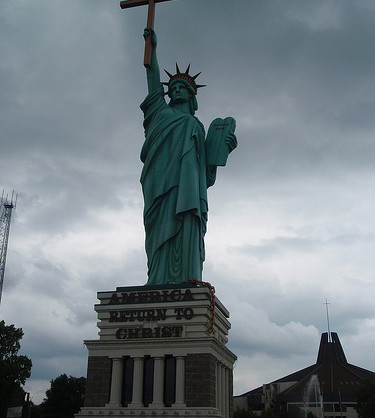This post originally appeared on Tylor Standley’s blog.
“Blessed is the nation whose God is the LORD.” (Ps 33:12)
A simple Google image search of that verse reveals the relationship between patriotism and religion. I grew up in a culture where patriotism and Christianity were virtually synonymous. American flags and crosses stood beside each other in the church auditorium. We celebrated national holidays by singing songs about God’s blessed nation. We were on a mission to “take America back for God” (i.e. to vote Republican and oppose the teaching of evolution).
However, the older I grew the more uncomfortable I became when I saw stars and stripes next to the cross and communion.
It may surprise you to know that our patriotic memorabilia fails to give us the whole verse from Ps 33:12 (much less the context).
“Blessed is the nation whose God is the LORD, the people he chose for his inheritance” (emphasis mine).
Who are the people he chose for his inheritance?
We know from God’s promise to Abraham and the subsequent fulfillment of that promise (i.e. the gospel) that God chose the nation of Israel for his inheritance. They sang this Psalm during celebrations as praise for God’s work in creation and his covenant faithfulness. They praised God for being their protector, deliverer, and redeemer.
Yet, it came as a surprise for Israel to find out that the Kingdom is much bigger than they ever dreamed. While they were soaking up the exclusivity of their election, God was out in the world drawing people to himself. The True Israelite, the Seed of Abraham—Jesus—was blessing the world just as God promised.
Romans 9 begins Paul’s brilliantly complex explanation of God’s fulfillment of Israel’s election, in which Gentiles are now included. “For not all who are descended from Israel are Israel,” he says in verse 6. As he says in Gal 3:7, “Understand, then, thatthose who have faith are children of Abraham.” That is to say, the True Israel is a spiritual nation, not a geopolitical one. To put it another way, the Church is the nation whose God is the LORD.
“There is neither Jew nor Gentile…for you are all one in Christ Jesus,” Paul goes on to say in Galatians 3.
It is through the cross, not through a flag, that we can sing Psalm 33.
This brings us to the question at hand. Can America claim—by the cross of Jesus Christ—to be a nation whose God is the LORD? A nation “under God?” A Christian nation?
If so, what makes it such?
Is it the alleged faith of our founding fathers? The legal privileges extended to Christian institutions and citizens? The percentage of Christian citizens? The fact that our money says “In God We Trust,” that our pledge says “One nation under God,” or that the Liberty Bell has a Bible verse etched into it?
Apart from the difficulty of determining what exactly makes a nation “Christian,” we have another conundrum. The Kingdom of God—which is the inheritance of God’s people—isn’t exactly compatible with any world power.
That is because, as scripture tells us, Satan rules the national powers of the world (cf Lk 4:5-8; Jn 12:31, 14:30; 2 Cor 4:4). Satan once offered to relinquish his power over the world. He offered Jesus a “Christian nation” for a much cheaper price and more efficient means than what he would pay at the cross. For a simple act of worship to Satan, Jesus could have unilateral, unchallenged control of the nations. Jesus refused to assert his power over people and instead put himself below them and became a servant, even to the point of death.
The Israelites fully expected the Messiah to establish a “Christian nation.” That is, they expected the Messiah to set up a government based on biblical law. One that would overthrow the tyrannical Roman government. Jesus—in unashamedly political actions—blatantly mocked such nationalistic zeal by doing things like preaching the Sermon on the Mount, riding into Jerusalem on a donkey instead of a horse, cursing the temple, rebuking the use of the sword, denouncing all human structures of authority, and telling people to “give to Caesar what is Caesar’s…”
In effect, Jesus made it clear that there would be no rise of a Messianic government—no “Christian nation.” There is the world and there is the Kingdom of God. The two cannot be married.
In fact, during his interrogation by Pilate, Jesus said, “My kingdom is not of this world. If it were, my servants would fight to prevent my arrest by the Jewish leaders. But now my kingdom is from another place” (Jn 18:36).
The powers of the world are governed by the enemy. They operate in ways antithetical to the Kingdom. How can we partner with the enemy in order to bring the Kingdom of God? How can we build a worldly empire, conquer the world by military power, and claim that it is all in Jesus’ name? Jesus teaches that you cannot serve two masters. Our allegiance cannot be pledged to a worldly kingdom as well as to the Kingdom of God. They are fundamentally opposed. We are not citizens of this world. We are citizens of Heaven.
World powers destroy enemies. Kingdom citizens love and care for enemies.
World powers take up the sword. Kingdom citizens take up the cross.
World powers enslave people to debt. Kingdom citizens free people from debt.
World powers sacrifice others for personal and political gain. Kingdom citizens sacrifice themselves for others’ wellbeing.
World powers desire the power of authority. Kingdom citizens desire the humility of submission.



Missio Alliance Comment Policy
The Missio Alliance Writing Collectives exist as a ministry of writing to resource theological practitioners for mission. From our Leading Voices to our regular Writing Team and those invited to publish with us as Community Voices, we are creating a space for thoughtful engagement of critical issues and questions facing the North American Church in God’s mission. This sort of thoughtful engagement is something that we seek to engender not only in our publishing, but in conversations that unfold as a result in the comment section of our articles.
Unfortunately, because of the relational distance introduced by online communication, “thoughtful engagement” and “comment sections” seldom go hand in hand. At the same time, censorship of comments by those who disagree with points made by authors, whose anger or limited perspective taints their words, or who simply feel the need to express their own opinion on a topic without any meaningful engagement with the article or comment in question can mask an important window into the true state of Christian discourse. As such, Missio Alliance sets forth the following suggestions for those who wish to engage in conversation around our writing:
1. Seek to understand the author’s intent.
If you disagree with something the an author said, consider framing your response as, “I hear you as saying _________. Am I understanding you correctly? If so, here’s why I disagree. _____________.
2. Seek to make your own voice heard.
We deeply desire and value the voice and perspective of our readers. However you may react to an article we publish or a fellow commenter, we encourage you to set forth that reaction is the most constructive way possible. Use your voice and perspective to move conversation forward rather than shut it down.
3. Share your story.
One of our favorite tenants is that “an enemy is someone whose story we haven’t heard.” Very often disagreements and rants are the result of people talking past rather than to one another. Everyone’s perspective is intimately bound up with their own stories – their contexts and experiences. We encourage you to couch your comments in whatever aspect of your own story might help others understand where you are coming from.
In view of those suggestions for shaping conversation on our site and in an effort to curate a hospitable space of open conversation, Missio Alliance may delete comments and/or ban users who show no regard for constructive engagement, especially those whose comments are easily construed as trolling, threatening, or abusive.